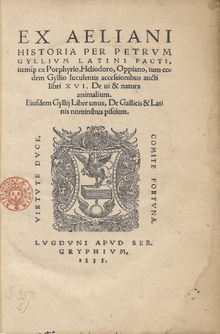Petrus Gyllius
Petrus Gyllius or Gillius (or Pierre Gilles) (1490–1555) was a French natural scientist, topographer and translator.[1]

Gilles was born in Albi, southern France. He travelled and studied the Mediterranean and Orient, producing such works as De Topographia Constantinopoleos et de illius antiquitatibus libri IV, Cosmæ Indopleutes and De Bosphoro Thracio libri III, and a book about the fish of the Mediterranean Sea. Among others, he spent the years 1544 to 1547 in Constantinople, where he had been sent by the King Francis I of France in order to find ancient manuscripts. He discovered a manuscript of the geographical work of Dionysius of Byzantium and wrote a Latin paraphrase of it. Most of his books were published after his death by his nephew. He also translated Claudius Aelianus in 1533. He died in Rome of malaria, while he was following his patron, Cardinal Georges d'Armagnac.[1]
Representation in fiction
Petrus Gyllius (as Pierre Gilles) plays a small but significant role in the book, Pawn in Frankincense, the fourth volume in the historical fiction series, The Lymond Chronicles, by Dorothy Dunnett.[2]
References
- Peter Gerard Bietenholz; Thomas Brian Deutscher (2003). Contemporaries of Erasmus: A Biographical Register of the Renaissance and Reformation. 1. University of Toronto Press. p. 98. ISBN 978-0-8020-8577-1. Retrieved 19 March 2013.
- Dunnett, Dorothy (1997). Pawn in frankincense (1st Vintage Books ed.). New York: Vintage Books. ISBN 978-0679777465.
Further reading
- Gilles, Pierre; Ball, John transl. (1986). The antiquities of Constantinople (2nd ed. with new introduction and bibliography. ed.). New York: Italica Press. ISBN 978-0934977012. Retrieved 13 September 2014.
- Harris, Jonathan (2009). Constantinople : capital of Byzantium ([Online-Ausg.]. ed.). London: Hambledon Continuum. ISBN 9780826430861. Retrieved 13 September 2014.
- Kelly, Laurence (1987). Istanbul : a traveller's companion. London: Constable. ISBN 9780094677302. Retrieved 13 September 2014.
- Byrd, Kimberly (2008). Pierre Gilles' Constantinople : a modern English translation with commentary. New York, NY: Italica Press. ISBN 978-0934977692. Retrieved 13 September 2014.
- Gilles, Pierre; Byrd, Kimberly transl. (2008). Pierre Gilles' Constantinople: The Latin Text. New York, NY: Italica Press. ISBN 978-1599101231.